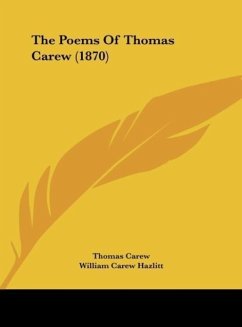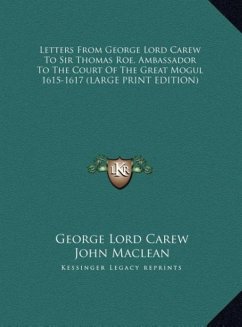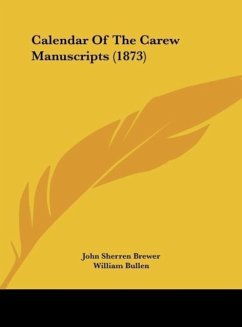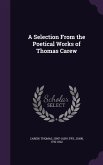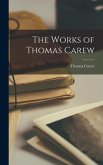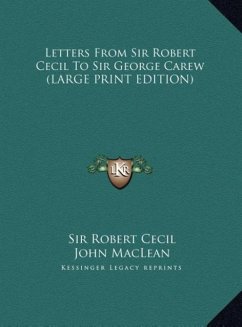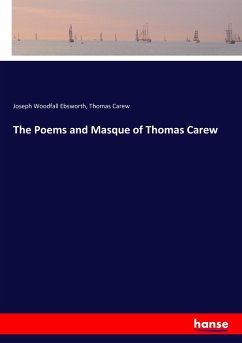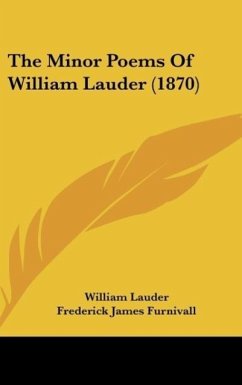Thomas Carew
The Poems Of Thomas Carew (1870)
Thomas Carew
The Poems Of Thomas Carew (1870)
- Gebundenes Buch
- Merkliste
- Auf die Merkliste
- Bewerten Bewerten
- Teilen
- Produkt teilen
- Produkterinnerung
- Produkterinnerung
This book is a facsimile reprint and may contain imperfections such as marks, notations, marginalia and flawed pages.
Andere Kunden interessierten sich auch für
![Letters From George Lord Carew To Sir Thomas Roe, Ambassador To The Court Of The Great Mogul 1615-1617 (LARGE PRINT EDITION) Letters From George Lord Carew To Sir Thomas Roe, Ambassador To The Court Of The Great Mogul 1615-1617 (LARGE PRINT EDITION)]() George Lord CarewLetters From George Lord Carew To Sir Thomas Roe, Ambassador To The Court Of The Great Mogul 1615-1617 (LARGE PRINT EDITION)38,99 €
George Lord CarewLetters From George Lord Carew To Sir Thomas Roe, Ambassador To The Court Of The Great Mogul 1615-1617 (LARGE PRINT EDITION)38,99 €![Calendar Of The Carew Manuscripts (1873) Calendar Of The Carew Manuscripts (1873)]() Calendar Of The Carew Manuscripts (1873)45,99 €
Calendar Of The Carew Manuscripts (1873)45,99 €![A Selection From the Poetical Works of Thomas Carew A Selection From the Poetical Works of Thomas Carew]() Thomas CarewA Selection From the Poetical Works of Thomas Carew32,99 €
Thomas CarewA Selection From the Poetical Works of Thomas Carew32,99 €![The Works of Thomas Carew The Works of Thomas Carew]() Thomas CarewThe Works of Thomas Carew33,99 €
Thomas CarewThe Works of Thomas Carew33,99 €![Letters From Sir Robert Cecil To Sir George Carew (LARGE PRINT EDITION) Letters From Sir Robert Cecil To Sir George Carew (LARGE PRINT EDITION)]() Robert CecilLetters From Sir Robert Cecil To Sir George Carew (LARGE PRINT EDITION)38,99 €
Robert CecilLetters From Sir Robert Cecil To Sir George Carew (LARGE PRINT EDITION)38,99 €![The Poems and Masque of Thomas Carew The Poems and Masque of Thomas Carew]() Joseph Woodfall EbsworthThe Poems and Masque of Thomas Carew25,90 €
Joseph Woodfall EbsworthThe Poems and Masque of Thomas Carew25,90 €![The Minor Poems Of William Lauder (1870) The Minor Poems Of William Lauder (1870)]() William LauderThe Minor Poems Of William Lauder (1870)28,99 €
William LauderThe Minor Poems Of William Lauder (1870)28,99 €-
-
-
This book is a facsimile reprint and may contain imperfections such as marks, notations, marginalia and flawed pages.
Hinweis: Dieser Artikel kann nur an eine deutsche Lieferadresse ausgeliefert werden.
Hinweis: Dieser Artikel kann nur an eine deutsche Lieferadresse ausgeliefert werden.
Produktdetails
- Produktdetails
- Verlag: Kessinger Publishing, LLC
- Seitenzahl: 306
- Erscheinungstermin: 23. Mai 2010
- Englisch
- Abmessung: 286mm x 221mm x 21mm
- Gewicht: 1034g
- ISBN-13: 9781161722086
- ISBN-10: 1161722084
- Artikelnr.: 30989808
- Herstellerkennzeichnung
- Libri GmbH
- Europaallee 1
- 36244 Bad Hersfeld
- gpsr@libri.de
- Verlag: Kessinger Publishing, LLC
- Seitenzahl: 306
- Erscheinungstermin: 23. Mai 2010
- Englisch
- Abmessung: 286mm x 221mm x 21mm
- Gewicht: 1034g
- ISBN-13: 9781161722086
- ISBN-10: 1161722084
- Artikelnr.: 30989808
- Herstellerkennzeichnung
- Libri GmbH
- Europaallee 1
- 36244 Bad Hersfeld
- gpsr@libri.de
Thomas Carew (1595-1639) was the son of Sir Matthew Carew, master in chancery, and his wife Alice Ingpenny, widow of Sir John Rivers, Lord Mayor of London. The poet was born at West Wickham, Kent. At the age of thirteen, in June 1608, he matriculated at Merton College, Oxford, where he took his B.A. in 1611, and went on to study at the Middle Temple. Evidently his legal studies were not central to his concerns, and two years later his father complained to Sir Dudley Carleton of young Thomas' lack of diligence or progress. As a favour, Sir Dudley took him on as part of his own household during his embassy to Venice, and after Carleton's return, he appears to have kept Thomas on, for he was still emptied by him, as secretary, at The Hague, in early 1616. He was dismissed, however, in the autumn of 1616 for levity and slander, and had great difficulty in obtaining another post.In August 1618 his father died, and Carew entered the service of Lord Herbert of Cherbury, and continued to travel with him on his diplomatic missions until April 1624. Carew received the court appointment of gentleman of the privy chamber in 1628. While in this office, he is reputed to have demonstrated great tact by stumbling and extinguishing the candle he was holding to light Charles I into the Queen's chamber, upon seeing that Lord St. Albans had his arm round the Queen's neck. The king suspected nothing, and the queen accordingly granted Carew a number of favours.In 1630, Carew was made "sewer-in-ordinary", or taster to the king. His close friendship with Sir John Suckling, Ben Jonson and Clarendon dates to this period; Clarendon said that Carew was "a person of pleasant and facetious wit." John Donne, famed as both poet and as court-preacher until his death in 1631, exercised a powerful influence over Carew's writing, as did Jonson. In February 1633 a masque by Carew, Coelum Britanicum, was performed in the banqueting-house at Whitehall, with sets by Inigo Jones, and was printed in 1634. This was apparently successful, but Carew undertook no further such compositions, and his poetic activity seems to have died down at about the same time.The last years of Carew's life are more obscure. The first edition of his Poems was published in 1640, and the book went through two further augmented editions in the following six years. He was regarded as a leading talent during his time, if not the equivalent of Donne or Jonson, or even the then fashionable Cleveland, but his star rose again during the 20th century.

